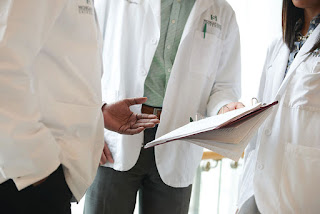Student Post: What's It Like To Be An M2/MCE?
 Question: What’s it Like to be an M2?
Question: What’s it Like to be an M2?Two years ago next month, I interviewed to be a part of the College of Human Medicine (CHM) Class of 2022. I was overjoyed to be accepted!
I remember vacationing with my family the following summer, during the fleeting weeks of pre-med school life. They asked: What do you do in medical school?
I knew my schedule for the upcoming M1/ECE year would involve anatomy lab, pathology lab, clinical simulation lab, small- and large-group learning activities, as well as weekly clinical experiences in an outpatient primary care office. But beyond that, I had no idea what the future would hold.
The college's Shared Discovery Curriculum breaks the training down into three main periods: the first year is the Early Clinical Experience (ECE), the second year is the Middle Clinical Experience (MCE), and the third/fourth years are the Late Clinical Experience (LCE).
So I wondered: How will things be different as an M2/MCE?
In the blink of an eye, after three semesters of the hardest, most rewarding work that I have ever done, I became an M2. For those of you wondering what I wondered just one short year ago, here are some of the things that an M2 does at the MSU College of Human Medicine:
- Clinical rotations (more to come about these in an upcoming post). As an M2, you get invaluable clinical time in several settings, from outpatient women’s health to nursing to physical therapy. Per the CHM Admissions website, "The MCE provides more advanced clinical experience in both ambulatory and inpatient care environments ... Students rotate through multiple clinical settings, learning with and from attending physicians, residents, respiratory therapists, physical therapists, pharmacists, social workers and other members of the health care delivery team." So far, I have rotated through women’s health, nursing, and inpatient pediatric wards. I have absolutely loved these experiences and have learned so much from them! Here's a breakdown of MCE rotations:
- Small- and large-group learning activities. Each week, I have one clinical rotation-specific and one topic-specific small group session. I also attend a weekly large group learning activity with my 94 colleagues at the Grand Rapids campus. Last week, we learned about topics in genetics at this lecture. This week, we will be learning about topics in cancer.
- Clinical simulation. This is an activity where we learn important clinical tasks, such as catheter placement, pediatrics-focused physical exam skills, and strategies to collaborate with diverse patient populations in shared decision making about treatment options.
- Studying for the USMLE Step 1 exam. When I’m not in class or clinic, I spend a large chunk of each day doing Anki flashcards and reading Robbins and Cotran Pathologic Basis of Disease or other textbooks in preparation for "Step." This is arguably the “biggest” exam of medical school, which I will take in June 2020.
- Recharging. I budget time every single day for an activity that I love to do, not related to medical school. My favorite activities are running, spending time with my husband, and watching college football (Go Hoosiers!).
I hope that this post has helped shed some light on what to expect as an M2 at the MSU College of Human Medicine! Best of luck to those of you reading this who will interview at CHM this year!
Elizabeth Bruce is a second-year student from Ohio. Prior to matriculation at the College of Human Medicine, Bruce graduated with a BME in Music Education from Indiana University as well as a BS in Biomedical Science from Western Michigan University. Also check out her first post, "About Organs: First-Year Student's Nontraditional Journey Led to CHM"






Selam dünya, hayat bayram olsa.
ReplyDelete